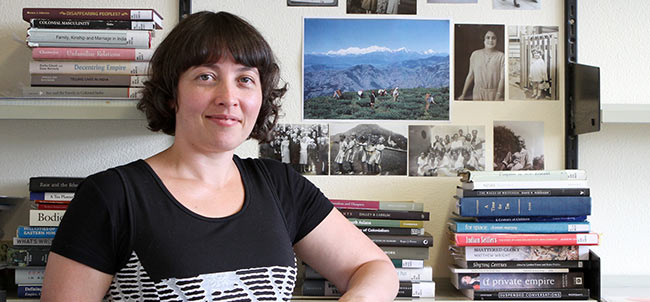
Historian and PhD candidate Jane McCabe
When you're a doctoral student, a little publicity can go a long way.
History PhD candidate Jane McCabe found that this year when she attracted national media attention for her thesis topic: the Kalimpong Kids.
Between 1908 and 1938, 130 Kalimpong Kids, the children of British tea planters and local Indian women, were sent by their fathers to an institution in Kalimpong and from there to the colonies to work as domestics or farm labourers.
Miss McCabe discovered the children when she decided to look into the history of her grandmother, the daughter of a Nepalese tea worker and an English plantation owner, who was sent to Dunedin to work as a domestic servant.
She was one of many raised in an institution in Kalimpong, India, established by Scottish Presbyterian missionary, Dr John Graham, who looked at the lives these children would have led, product of two cultures and welcome in neither, and decided to make a difference.
A media release sent out by the University of Otago on Miss McCabe's project attracted national print and radio media, and proved a surprising and effective source of research material for her.
“I felt I had four or five really good case studies covering about 20 families, which would be a great base for my thesis.”
The media attention, however, more than doubled that number, “broadened my understanding” and provided a potential dataset which will add to the depth of her thesis.
“I found that of the many families who contacted me, they didn't just want to contribute to my data, but they were also really grateful that someone was telling their story.”
Dr Graham established the St Andrews Colonial Homes at Kalimpong, where he gave the children a British education and upbringing, as well as manual training. They lived in cottages on the property with a house mother and an “aunty”, until they were 15 or 16 years old.
They were then shipped off to a colony where a position with a family, who had connections either to the tea planters or the church, had been found for them. They were contracted to stay for two to three years, but were then welcome to settle down or move on.
Miss McCabe has spent the past two years researching the emigrants sent to New Zealand, which she has found was the most common destination for those who were sent abroad.
All of the original emigrants have since died but Miss McCabe's efforts are helping to connect their families.
“I plan to write a book based on all the wonderful stories I've collected. I can't use them all in my thesis,” she says.
In the meantime, she continues to operate a website, which was getting up to 100 hits a day after the media articles, and hopes to plan a reunion of the families in the future.
An e-newsletter for people interested or involved in postgraduate study at the University of Otago
Archive
Subscribe
The Otago Post is distributed via email three times a year.
Subscribe to the Otago Post.
